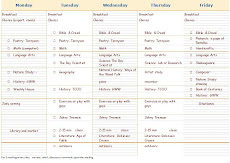So, the way I understand this is that the objectives of study in civics are:Like Literature this subject, too, is ancillary to History. In Form I, children begin to gather conclusions as to the general life of the community from tales, fables and the story of one or another great citizen. In Form II, Citizenship becomes a definite subject rather from the point of view of what may be called the inspiration of citizenship than from that of the knowledge proper to a citizen, though the latter is by no means neglected.
We find Plutarch's Lives exceedingly inspiring. These are read by the teacher (with suitable omissions) and narrated with great spirit by the children. They learn to answer such questions as,––"In what ways did Pericles make Athens beautiful? How did he persuade the people to help him?" And we may hope that the idea is engendered of preserving and increasing the beauty of their own neighbourhood without the staleness which comes of much exhortation. Again, they will answer,––"How did Pericles manage the people in time of war lest they should force him to act against his own judgment?" And from such knowledge as this we may suppose that the children begin to get a sympathetic view of the problems of statesmanship.
Then, to come to our own time, they are enabled to answer,––"What do you know of (a) County Councils, (b) District Councils, (c) Parish Councils?"––knowledge which should make children perceive that they too are being prepared to become worthy citizens, each with his several duties. Our old friend Mrs. Beesley's Stories from the History of Rome helps us here in Form IIB instead of Plutarch, illumined by Macaulay's Lays of Ancient Rome.
- Understanding of what goes on in the larger community.
- Inspiration in citizenship (one's own civic duties, and sympathy towards the difficulties of statesmanship)
- Knowledge proper to a citizen.
Now Plutarch is like the Bible in this, that he does not label the actions of his people as good or bad but leaves the conscience and judgment of his readers to make that classification. What to avoid and how to avoid it, is knowledge as important to the citizen whether of the City of God or of his own immediate city, as to know what is good and how to perform the same. Children recognise with incipient weariness the doctored tale as soon as it is begun to be told, but the human story with its evil and its good never flags in interest. ... Children like ourselves must see life whole if they are to profit. At the same time they must be protected from grossness and rudeness by means of the literary medium through which they are taught. A daily newspaper is not on a level with Plutarch's Lives, nor with Andrew Lang's Tales of Troy and Greece, though possibly the same class of incidents may appear in both. The boy, or girl, aged from ten to twelve, who is intimate with a dozen or so of Plutarch's Lives, so intimate that they influence his thought and conduct, has learned to put his country first and to see individuals only as they serve or dis-serve the State. Thus he gets his first lesson in the science of proportion. Children familiar with the great idea of a State in the sense, not of a government but of the people, learn readily enough about the laws, customs and government of their country; learn, too, with great interest something about themselves, mind and body, heart and soul, because they feel it is well to know what they have it in them to give to their country.
So it seems that intimacy with a few examples of Lives (suitably excerpted) is more importance than general knowledge of many.
The science of proportion -- and seeing the whole, but not in gross terms.
- I plan to read Theseus and Romulus with him, and possibly the comparison.
- Also Lycurgus and Solon.
Charlotte Mason wrote Ourselves to talk about virtue. I have a few books around the house:
- Joyful Mysteries of Life
- The Catholic Book of Character and Success (for slightly older children)
- Growing in the Virtues of Jesus



No comments:
Post a Comment